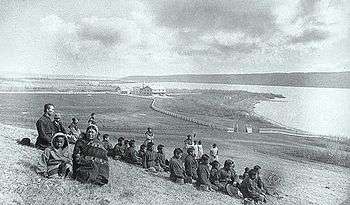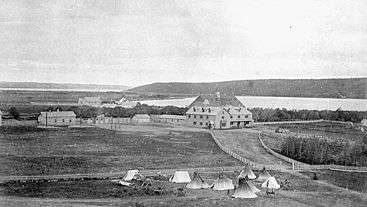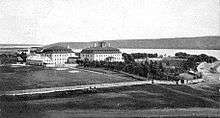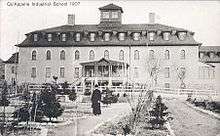Qu'Appelle Indian Residential School

Qu'Appelle Indian Residential School or Qu'Appelle Industrial School was a Canadian residential school financed by the federal government. It was operated from 1884 to 1969 by the Roman Catholic Church for First Nations children and was run by the Missionary Oblates of Mary Immaculate and the Grey Nuns. It was located on what is now the Wa-Pii Moos-toosis (White Calf) Indian Reserve of the Star Blanket Cree Nation adjoining the village of Lebret, Saskatchewan.[1]
Lebret is situated on the northeast shore of Mission Lake in the Qu'Appelle Valley 6 km east of Fort Qu'Appelle on Highway 56
History



Qu'Appelle Industrial School was built in 1884 to fulfil one of the conditions of Treaty 4, signed in 1874, which was to provide schools and education for First Nations children. Fifteen students were enrolled in the first year with Father Joseph Hugonard as the first principal.
"With the assistance of the Grey Nuns, a few Oblate fathers, and lay instructors, Hugonard was to make Qu’Appelle Industrial School a model Catholic educational facility for native people and the largest such institution in Canada. The native children, in parallel boys’ and girls’ schools, attended classes for half the day and engaged in domestic or agricultural pursuits the other half. English was the language of instruction; the girls played croquet and the boys cricket."[2]
The Grey Nuns taught at the school until 1975. The first building was destroyed by fire in 1904 and the second Qu'Appelle Industrial School was destroyed by fire in 1932. It was replaced by the Qu'Appelle Indian Residential School in 1935. The school was expanded with additions and a gymnasium and St. Paul's High School was added to the complex in 1951.The school was closed in 1969.[3]
White Calf Collegiate
The school re-opened under the operations of the reserve in 1973, and renamed White Calf Collegiate, but closed in August 1998.[4] White Calf Collegiate, operated by the Star Blanket Cree Nation, was demolished in 1999 a year after it closed.[1]
See also
References
- 1 2 Stephen LaRose (1999). "Wrecker's ball claims White Calf Collegiate". Volume 3, issue 8, page 18. Aboriginal Multi-Media Society (Saskatchewan Sage). Retrieved 14 June 2015.
- ↑ Jacqueline Gresko (1998). ""HUGONARD, JOSEPH," in Dictionary of Canadian Biography, vol. 14". University of Toronto/Université Laval. Retrieved 15 June 2015.
- ↑ "Lebret healthcare: A journey through time" (PDF). Saskatchewan Population Health and Evaluation Research Unit. September 2012. Retrieved 14 June 2015.
- ↑ David McLennan (2006). "Lebret". The Encyclopedia of Saskatchewan. Retrieved 14 June 2015.
External links
Coordinates: 50°45′32.9″N 103°42′40.26″W / 50.759139°N 103.7111833°W